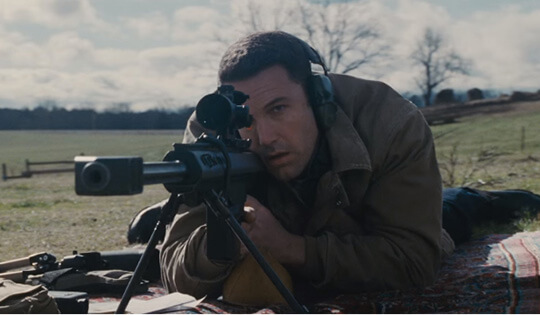




What’s It About
Christian Wolff (Ben Affleck) is a mathematics savant with more affinity for numbers than people. Using a small-town CPA office as a cover, he makes his living as a freelance accountant for dangerous criminal organizations. With a Treasury agent (J.K. Simmons) hot on his heels, Christian takes on a state-of-the-art robotics company as a legitimate client. As Wolff gets closer to the truth about a discrepancy that involves millions of dollars, the body count starts to rise.



MOVIESinMO REVIEW
Ben Affleck’s 2016 thriller “The Accountant” presents viewers with an intriguing premise: a high-functioning autistic male who works as both a forensic accountant for criminal syndicates and as a highly trained assassin. The film, directed by Gavin O’Connor, attempts to balance action, drama, and a touch of neurodiversity awareness but can’t manage to balance all these things in a satisfying way. Right from the start, it’s clear that “The Accountant” is attempting to be more than just a typical action film. Christian Wolff (Affleck) is established as a math genius who becomes self-calming through numbers and completion. The movie is at least partially successful in presenting us with an autistic portrayal without falling into the typical Hollywood tropes of helplessness or super-skilled talents – although it very much does fall into the latter’s trap when it can. What works best about “The Accountant” is its lone hero. Affleck delivers a stoic performance, avoiding caricature but still imbuing Wolff with social awkwardness and suffocating habits. His history, shown in flashbacks, accounts for his unusual skill set and emotional reserve. Action scenes are well-staged and gruesome, with Affleck performing convincingly the role of man sharpened to deadly proficiency. But where the film goes wrong is in its overly complicated plot. What begins as a straightforward story of exposing accounting irregularities at a robotics company quickly devolves into a morass of government agents, killers, and family pathology. The third act has the plot strings multiplied to the point that the audience needs their own forensic accounting skills to stay on top of things. The supporting cast does the best it can with what it has. J.K. Simmons brings gravity as the director of the Treasury Department who’s hot on Wolff’s trail. Anna Kendrick is a winner as Dana Cummings, a young accountant who’s both would-be love interest and emotional center of the movie. But neither of them is ever fully fleshed out, too frequently being reduced to devices to move the plot forward or provide exposition. As a Black viewer, I couldn’t help but be reminded of how little the film had to say about race. The film’s lead, Jon Bernthal’s hitman lead, provides some of the film’s best moments, but the rest of the cast is still overwhelmingly white in leading roles. This isn’t specifically a criticism of “The Accountant,” exactly, but an observation of Hollywood’s ongoing struggle with representation, particularly in expensive big-budget action thrillers. More concerning, however, is how the film addresses disability. Although “The Accountant” attempts to provide an enlightened portrayal of autism, it most frequently steps into dangerous territory by suggesting that Wolff’s illness somehow explains his violent abilities. His neurodivergence, the narrative would have us believe, makes him inclined to both be an accountant and an assassin – a toxic conflating of bad information suggesting autism is equated with savant abilities or emotional numbness. The final act of the movie struggles under some unavoidable plots twists and hurried and too-easy resolution. With two hours’ worth of buildup as mystery and motivation behind characters’ behavior, “The Accountant” settles it off with a bouquet of revelations forcing incredulity. It’s an emotional return that’s not well-deserved given Wolff’s depiction throughout the film of being someone who doesn’t quite seem to be all that comfortable engaging with people. Visually, “The Accountant” is made professionally. O’Connor’s work is crisp and efficient, particularly in action set pieces. Seamus McGarvey’s camera work gives a clinical, chill world that’s a reflection of Wolff’s. But this visual vocabulary is on shaky ground, at times collapsing into more conventionally action film-like looks. What ultimately kills “The Accountant” is that it simply can’t decide what type of movie it needs to make. Is it a character study of neurodiversity? A straightforward action film? An intelligent crime thriller? By attempting to be both, it does neither to perfection. The film’s commentary on autism feels superficial at best and perhaps even perilous at worst, using the condition as a plot device without truly examining the life on the spectrum. Despite these flaws, “The Accountant” is worth seeing due largely to Affleck’s committed performance and some truly electrifying action set pieces. There’s something refreshing about an action hero whose greatest asset is his intellect rather than his muscle, although the execution of this concept isn’t ideal. “The Accountant” also poses intriguing questions about family, trauma, and how we manage difference. Wolff’s relationship with his military father, who subjects him to sadistic training instead of conventional therapy, is morally complex and ambivalent. The film does not fully judge this as wrong, proposing that in certain respects it readied Wolff for survival in a world not constructed for him. Overall, “The Accountant” is a fascinating idea that fails to realize the potential of its parts. It offers up moments of actual tension and a hero who isn’t most action heroes, but stumbles on execution and message. For viewers watching for an action thriller twist, it gives enough to its runtime to make it worth the watch. But for audiences anticipating a considered examination of neurodiversity or an understandable crime thriller, the maths doesn’t work. Essentially, “The Accountant” is Hollywood’s ongoing battle to tell difference without othering or fetishizing it. Like its protagonist, the film performs some technical aspects well but struggles to connect. It’s a decent thriller that could have been great if only it had balanced its books more assiduously.
OUR RATING – AN ATYPICAL 6
MEDIA
- Genre – Action
- Street date
- Digital – December 27, 2016
- 4K/Blu-Ray/DVD – January 10, 2017
- Video – 1080p
- Screen size 2.40:1
- Sound – English, Spanish Dolby Digital 5.1
- Subtitles – English SDH, Spanish, French
Extras
- Inside the Man (HD, 11 min) — Typical EPK-like piece with cast and interviews talking about the plot and protagonist while sharing their impressions of the film’s theme.
- Behavioral Science (HD, 8 min) — Mostly focused on Dr. Laurie Stephens talking about her participation in the production while filmmakers reveal their preparation for bringing it to the screen.
- The Accountant in Action (HD, 7 min) — Essentially more of the same, except focused on the character’s physical abilities and the fight choreography.

